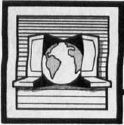The World Inside the Computer

Fred D'lgnazio, Associate Editor
Pieces Of Our Past—The Computer Puzzle
Last month I told the story of my "Phantom Programmer," Hunter Baker, a high school student I recruited to organize my attic and computer room. The story ended with me nervously charging into the computer room waving a machete in the middle of the night after mistaking Hunter and his friend, Amy Powell, for burglars. Actually, they were working on a school project for National History Day: a history trivia game for the IBM computer.
Hunter and Amy entered their program in the regional History Day competition and won first place in the Senior Media Presentation category. And no wonder! They had spent dozens of hours collecting hundreds of history questions and typing them into the computer, where they were stored as six random data files representing six question categories: Presidents, Places, Historical Figures, U.S. Constitution, Wars and Battles, and Trivial Trivia. And while Hunter was writing a program that managed all the questions, Amy was using Mouse Systems' PC Paint to create seven beautiful picture screens—a title screen and a screen for each category.
Confident after their victory in the regional competition, Hunter and Amy took their history trivia game—called "Pieces of Our Past"—to the state competition at Lynchburg College, in Lynchburg, Virginia.
But the two young people received a rude shock. The state judges said their program was not a media project at all, and gave them low grades in almost every category. One judge wrote that the project "shows no work." Another judge gave Hunter and Amy 0 out of a possible 15 points for "Quality of the Medium." Several judges gave the program low grades for historical accuracy, yet every one of Hunter and Amy's questions and answers came from reliable sources such as textbooks and encyclopedias.
Worst of all, the judges refused to interact with the program. During the judging they sat in their chairs, far away from the computer screen and keyboard, and declined to come any closer—even when Hunter and Amy invited them. Later, one judge wrote on the judging sheet: "Not effective media presentation. I couldn't see the screen."
Hunter and Amy returned from the History Day competition disappointed and bewildered. They had put an enormous amount of work into their project. They had come up with an innovative approach to learning history facts, and they had demonstrated a mastery of their medium. Hunter's program made use of random data files, elaborate graphics (created, pixel by pixel, by Amy), and music. By storing the pictures in the IBM's video memory and the music in another memory buffer, Hunter's program was able to display a picture, play music, and build the question arrays all at the same time.
But their program lost. Why? Do history teachers fear the computer? Don't they recognize the computer as a valid educational medium, like slides, filmstrips, videotapes, or 8mm movies?
A New Media Is The Message
I think history teachers are no more afraid of computers than anyone else, but like almost everyone else, few of them see the computer as "media." And since the computer is a new form of media, with its own special needs and limitations, no one was quite prepared for Hunter and Amy's project, which was so different that it bewildered the judges, confounded the rules, and didn't fit into any of the project categories.
I imagine the judges had no idea how much work and original thinking went into "Pieces of Our Past." All this work was stored, invisibly and electronically, inside the computer as hundreds of lines of code, computer records, and screen maps.
And the judges were not prepared to interact with a media project. In the past, they had sat back, passively, and been informed, educated, or entertained. Now they were being asked to sit down in front of an unfamiliar keyboard, read the display screen, and answer questions without any preparation. What a fright! They might have pressed the wrong key and looked foolish. Or worse, they might have answered one of the history questions incorrectly in front of their colleagues (all fellow history teachers, instructors, and professors).
Everyone—Hunter, Amy, the judges—was burned by this experience. In the future, I doubt if Hunter and Amy will be quite as innovative or work quite as hard or independently on a project like this. And I know the judges feel bad, too. They saw merit in Hunter and Amy's project, but they didn't understand it, and they didn't know how to compare it with the other projects, or rate it according to the rules of the competition.
This was just a small incident, but I fear similar ones are occurring all over the U.S. when young people try to incorporate computers into projects that baffle and confuse their elders. Bright, self-motivated young people can come up with all sorts of ingenious uses for computers that many of us older folks have never dreamed of. But I'm worried that we may not be ready for them when they do.
What do you think? Have you had any similar experiences? Please write me care of COMPUTE!.